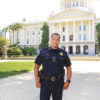Profitable Handout
City could cash in on soccer investment
By R.E. Graswich
March 2020
One of my favorite councilmen, Jeff Harris, took exception to a column about the city’s partnership with the Sacramento Republic, the local sports club ready to leap into Major League Soccer.

Harris wrote to say he disagreed with the headline over my story, which led with the words, “Soccer Handouts.” If I wanted to be cagey, I would have told him I didn’t have control over the headline, that a belligerent editor slapped the offending words above the story and it wasn’t my fault.
But that would be a lie. In fact, I suggested the headline to the editor. I hoped it would attract readers such as Jeff Harris.
The story mentioned how the City Council agreed to provide at least $33 million for incentives to the Republic when it builds a new soccer stadium in the Downtown railyards.
The biggest chunk of the incentive—$27.2 million—is a loan to the Republic. I thought the loan was ironic. After all, the city is always short of cash and asking taxpayers for more money. Meantime, Ron Burkle, who owns the local soccer team, measures his wealth with a billion-dollar scale. He doesn’t need a loan.
Also, I was concerned by how Mayor Darrell Steinberg negotiated the general terms with Burkle and MLS executives before any agreement could be discussed by the City Council. By the time the soccer incentive reached the council for public review, it was a done deal.
But that doesn’t mean it’s a bad deal, Harris insists. If the partnership works out the way Harris, Steinberg and other councilmembers hope, Sacramento will benefit in several ways—financially, culturally and economically in a bleak corner of the city.
“I’m not interested in being sold a bill of goods,” Harris says. “I’m pretty sure I haven’t drunk the Kool-Aid when it comes to Major League Soccer. But I do see potential here. We can end up with a new stadium. Plus we get a jump-started railyards and infrastructure. And we can make money on the deal.”
The pot of gold Harris seeks will be found in something called an Enhanced Infrastructure Finance District. By forming the district, the city can generate money to pay for infrastructure at a distressed site, such as the old Southern Pacific yards.
The finance district will benefit from taxes paid by the Republic and the entertainment attractions Burkle plans to build around his stadium. Without infrastructure, those businesses and their taxes would not exist. That’s why the city is making the loan.
Harris volunteered to lead the new finance district. This is good for two reasons: One, Harris is not a sports guy. He’s not star-struck by the MLS. Two, Harris is a business guy who knows how to meet a payroll. Few councilmembers pay closer attention to the people’s money than Harris.
Harris represents the railyards, so he has professional interest in soccer’s success. He thinks the city will make a return of better than 7.5 percent on its loan to the Republic, though we won’t know that for decades.
“We don’t have a final document that lays out all the terms,” he says. “That still has to be hammered out. So I can’t tell you exactly how I think it will play out. But from the numbers I’ve seen, I think we have a very good chance of getting an excellent rate of return.”
Here’s another reason why Harris is optimistic. He sees the Republic and MLS as a positive addition to Downtown, with tickets priced low enough for families.
“The thing I like about Republic soccer games is I can afford it,” he says. That’s something Burkle better remember when he starts selling tickets for the 2022 MLS season.
R.E. Graswich can be reached at regraswich@icloud.com. Follow us on Facebook, Twitter and Instagram: @insidesacramento.com.







